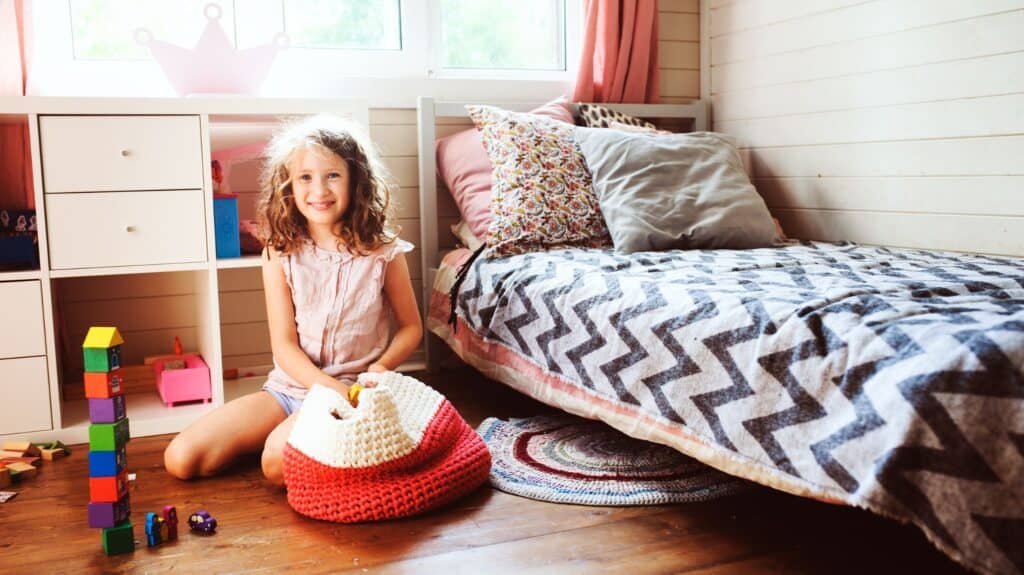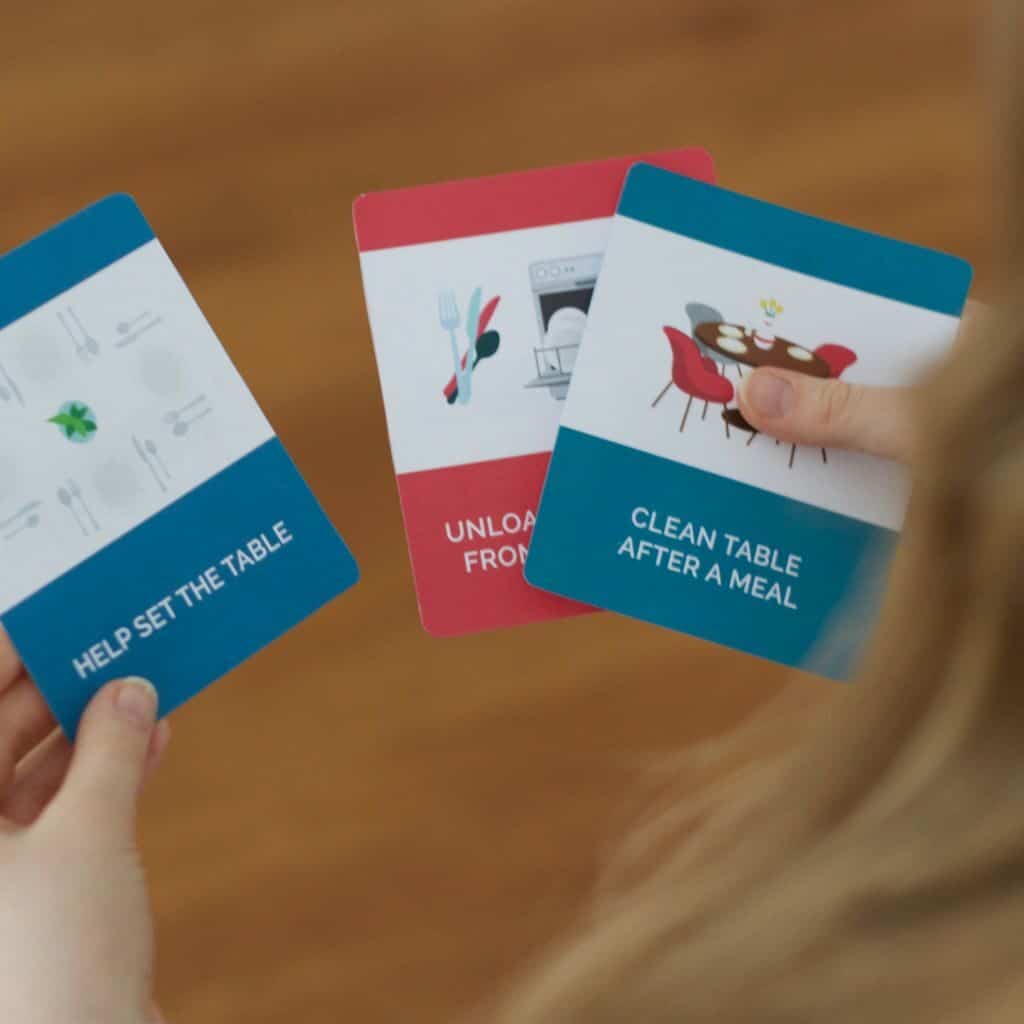5 Tips to Get Your Kids to Clean Their Messy Room
Getting kids to clean their messy room doesn’t need to be a constant battle. These five tips can help.

Slowly you open the door to your child’s bedroom, bracing yourself for what’s beyond.
As expected, clothes and socks cover the carpet, the bed is unmade, books and papers are strewn across the desk, and you think you spot a food wrapper next to the bed.
It seems impossible for your child to keep their room clean and neat.
You’ve tried to urge your child to clean their room. But that urging has usually resulted in arguments and power struggles with few results.
Why does getting your child to clean their room have to be so difficult?
- Why your child’s bedroom is always messy
- Why a clean bedroom is beneficial for kids
- Why you shouldn’t force your child to clean their room
- The age when kids should start cleaning their bedroom
- 5 steps to get your kids to clean their bedrooms without nagging or fights
- Keep the big picture in mind
- About Kerry Flatley
Why your child’s bedroom is always messy
Why is it such a challenge for your child to put their dirty laundry in the hamper? Or organize the papers on their desk? And at what point do kids realize that leaving dirty dishes in one’s room is simply gross?
The primary answer (although not the exclusive answer) comes down to your child’s executive functioning skills, or lack thereof.
Executive functioning essentially describes skills required for goal-directed behavior such as organization. And while most adults have decent executive functioning skills, kids’ executive functioning skills are less developed or still developing.
In other words, your child simply doesn’t have the capability or understanding yet to independently clean their bedroom because they’re still learning how to plan ahead, meet goals, organize, and follow through without distractions.
But just because kids lack these skills, doesn’t mean we need to take over and clean their bedrooms for them. In fact, getting your child to do tasks such as clean their room lets them practice executive functioning skills which in turn, helps these skills improve.
See related: What are Executive Functioning Skills in Children and Why are They Important?
Why a clean bedroom is beneficial for kids
Beyond the benefits kids gain from practicing executive functioning skills, research also shows that maintaining a clean room has benefits beyond just tidiness. A clean space can improve productivity, reduce stress, and even improve overall happiness.
Of course, many kids won’t appreciate these benefits until they’re able to experience them. It’s difficult to recognize that an organized desk will make one more productive or that cleanliness can reduce stress if you haven’t experienced it.
One thing kids are likely to recognize, however, is that an organized bedroom means no longer needing to rush around in the morning looking for clean soccer shorts, for example. Or no longer wasting a half hour searching for a phone charger just before going to bed.
It can take time for kids to recognize the full benefits of a clean bedroom, but the more we encourage cleanliness the more they’ll be able to experience it, and slowly (sometimes very slowly!) begin to recognize the benefits.
Why you shouldn’t force your child to clean their room
Yes, there are benefits to kids cleaning their bedrooms and living in a clean and organized space, but forcing your child to clean the mess in their room isn‘t a good idea.
Here’s why: No one likes to be dictated to or told what to do, and this is especially true with kids. In fact, telling your kids that they must clean their bedroom will decrease their motivation to do it.
Since we want to raise kids who grow to be internally motivated to maintain a clean and tidy bedroom, we need to use strategies that are encouraging and place the responsibility of a clean room in their hands. (See below for five tips on how to do this)
The more we work with our kids in a way that respects their autonomy while also helping them set standards for a clean bedroom, the more our children will begin to take on this responsibility themselves and appreciate the benefits of maintaining a tidy room.
The age when kids should start cleaning their bedroom
Ideally, you’ll want your child to get in the habit of cleaning their room in toddlerhood – a stage in their development when they’re eager to help.
This doesn’t mean your toddler will by any means be cleaning their room independently. Instead, you can encourage them to put toys away, place dirty clothes in their laundry hamper and make their bed every morning alongside you.
Modeling these tasks for your child will begin to teach them how to accomplish them. But possibly more important, you’ll be encouraging a helping mindset in your toddler or preschooler which they’ll carry with them as they mature.
By the time your child is in elementary school – around age 6 or 7 – you can begin to encourage them to clean their room independently, with your coaching and support. Kids at this age can’t be expected to do a perfect job, so keep the higher goal of encouraging a responsible mindset at the forefront.
Middle schoolers and high schoolers will want more independence and ownership over this task but may still need our support. At this age, strive to respect their autonomy while still working with your teen to achieve a clean and tidy bedroom.
Interested in getting your kids started on chores? My four-lesson course will teach you how to get started, avoid nagging & power struggles, and keep your kids motivated. Click here or the image below to learn more.

5 steps to get your kids to clean their bedrooms without nagging or fights
Now that you know the benefits of having kids clean their bedrooms, you’re probably wondering how to get them to do this without getting into constant power struggles.
The following 5 steps will help:
#1 – Create a cleaning plan together
As mentioned before, no one likes to be told what to do. But as your child’s parent, you still need to help them set boundaries and standards. So how can you find a balance?
First, stop thinking of yourself as a manager who dictates and instead think of yourself as a supportive coach – someone who helps set standards but recognizes the responsibility for performance is ultimately in your child’s hands.
This can be accomplished by beginning with a family meeting or simply a one-on-one conversation with your child. During this meeting, respectfully explain to your child(ren) why you feel it’s important for them to clean their bedroom – at least occasionally.
Next, let your child share with you their thoughts about cleanliness and why they find it difficult to maintain a clean room. Keep an open mind during this discussion and earnestly consider the situation from your child’s perspective.
#2 – Set (realistic) family standards
After both you and your child(ren) have stated your perspectives on their bedroom, work together to set family standards. But keep these standards realistic.
While ideally, you’d like your child to always have a neat and well-organized bedroom, this probably isn’t achievable. But what if you could agree that the room should at least be vacuumed, dusted and tidied once a week, for example?
Compromises may need to be made on both sides (you and your child’s) when arriving at a solution. The key is to respectfully work together, earnestly considering your child’s perspective, and arriving at a solution that meets both of your needs.
Also, allow your child as much control as possible about when and how these standards will be achieved. Meaning, let them decide when clean up time takes place. The more you allow your child to make decisions independently, the more likely they’ll be motivated to follow-through.
Additionally, keep in mind that the solutions you and your child come up with initially won’t be perfect. Maybe you discover that the time your child chose to do their weekly vacuuming is when they’re most exhausted, for example. If issues like this crop up, keep tweaking solutions, if necessary.
#3 – Declutter and organize
Now that you’ve set family standards and come up with solutions for how they’ll be carried out, it’s important to set your child up for success.
As any minimalist will tell you, it’s very difficult to maintain a clean space when there’s too much stuff in it. So if your child’s bedroom is too crowded, you’ll want to set aside time and work with them to purge and organize their space.
Kids will need your help trying to determine what to keep on their bedroom shelves, for example, or if it’s time to let go of certain toys or clothing they’ve outgrown. It can also be helpful to designate a halfway box – a place to put objects your child isn’t ready to let go but might reconsider if they haven’t been missed for many months, for example.
It’s also important to make sure your child’s bedroom is set up for proper organization. Do they have the storage, drawers, toy bins or baskets necessary to hold all the toys, books, and other gadgets in their room? Taking time to create an organized space will make tidying up easier.
#4 – Use routines and checklists as reminders
Two tools that will also set your child up for success and develop good habits are routines and checklists. These two tools also promote independence in kids and lessen the need for you to nag.
A daily routine could be that your child makes their bed every morning and makes sure toys, books, blankets, clothing or other items are in their proper place before going to bed.
A weekly routine could involve a quick vacuuming of floors and taking out the trash before Sunday dinner. And a monthly routine could involve a more thorough cleaning – dusting surfaces, vacuuming under the bed and changing bedsheets.
Incorporating checklists into the routine can also help kids operate independently and remind them of everything that needs to be done. (My Room Cleaning Cards provide an already-created template.)
Get your kids started on chores with these cards. They can serve as a visual reminder for kids and make doing chores fun! Click here to learn more.
#5 – Use the “first things first” rule
One of the most challenging issues for parents when trying to get their kids to clean is how to motivate them.
Research shows that giving kids rewards or paying them can diminish internal motivation and create a scenario where a child could eventually decide the money isn’t worth the effort anymore. And then the parent is stuck.
Instead, during that initial meeting with your family or child, work with them to determine when they would like to clean their room. And then, make it clear that the chore will need to be completed before your child moves on to other activities such as having screen time or playing with friends.
I call this the “first things first” rule. The task that needs to be completed must be done first before moving onto another – more enjoyable – activity.
Just be sure not to announce this rule to your child on the day the task is to be completed. Discussing this standard during your initial meeting is more respectful and won’t catch your child by surprise.
Keep the big picture in mind
While it may seem like the end goal here is a clean and tidy bedroom – this is really only part of the outcome when we encourage our kids to clean their rooms.
Kids learn a great deal whenever they’re asked to take on chores and responsibilities – such as essential executive functioning skills that will serve them well in life.
It’s helpful to always have this long run goal in mind when working with our kids. The more we respectfully coach and guide them, with patience and perseverance, the more we’ll be helping our children mature into the self-reliant and self-sufficient adults we desire them to be.
And likewise, the more our children will grow into a greater appreciation for cleanliness and organization in their bedroom.
See related:
10 Responsibilities at Home That Make Kids Feel Capable and Significant
Age-Appropriate Chores for Kids – Lists by Developmental Stage
How to Get Kids Started on Chores – and Keep Them Motivated
How to Get Toddlers and Kids to Clean up Toys in Six Easy Steps
What to do next…
1. Subscribe to Self-Sufficient Kids’ email list.
Like what you read here and want to learn more? Every Thursday I’ll send you one parenting tip about raising self-sufficient kids and creating the peaceful relationship you yearn to have with your child. Click here to sign up.
2. Take one of my quizzes!
Find out if you’re raising a self-sufficient kid (click here) or if you’re doing too much for your kids (click here). At the end of each quiz, you’ll be asked to provide your email address to see the results.
3. Get your kids started on chores.
Learn how to get your child started on chores (& keep them motivated + avoid power struggles) by enrolling in my Get Your Kids Successfully Started on Chores course. Click here to learn more and sign up.

About Kerry Flatley
Hi! I’m Kerry, the mother of two girls and a certified parent educator. I believe it is possible for parents to have a supportive, loving, and warm relationship with their kids while raising them to be independent and ultimately self-sufficient. Over the years, I’ve read numerous books and articles that support this belief and I’ve put these ideas into practice with my own kids. Read more about me and Self-Sufficient Kids here.


